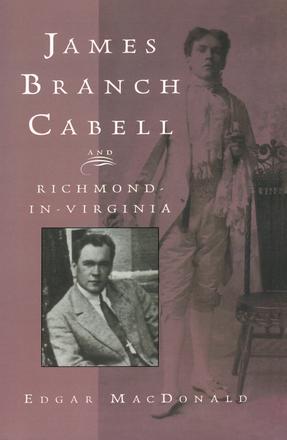
James Branch Cabell and Richmond-In-Virginia
In this inclusive examination of Cabell's life and milieu, a fascinating literary figure is rescued from the literary shadows and acknowledged as a writer of major worth in the canon of American literature.
Description
In his prime, Vanity Fair nominated James Branch Cabell for "Immortality" on its pages reserved for acclaiming the most select of notable achievers. Favored by the intelligentsia, Cabell was the author of a series of fabulous, well-told fictions that in the 1920s made him a household literary name. Among his many acclaimed books published by 1930 are Jurgen, The Lineage of Lichfield, The Silver Stallion, Something About Eve, The White Robe, and The Works of James Branch Cabell in eighteen volumes. By the time of his death in 1958 the list of his works had become prodigiously long, but he had been in eclipse for almost three decades. This definitive biography serves to restore to Cabell the recognition he deserves. Here he is portrayed as a jesting critic of southern chivalry, an ambivalent artist whose feelings for Richmond required a lifetime to reconcile. He was quintessentially a Virginian. His native Richmond shaped him, and its social milieu indelibly marked him. He matured as a writer in the climate of the postbellum South and excelled in subjecting the rigid graces of "Richmond-in-Virginia" to satire and burlesque. Like his fellow Virginian Ellen Glasgow, he had mixed emotions about home. Not to love Virginia was an act of betrayal, yet to condone its stultifying, Old South idealism was to betray oneself. With the deterioration of Richmond's Edwardian values in the 1920s Cabell emerged as a major literary figure, hailed as an iconoclast and debunker of myths, but by the 1930s his mannered, self-conscious style was out of fashion. Cabell was dogged by scandal. There was the question of homosexuality. It was charged that he murdered the man reputed to be his mother's lover. After a notorious New York trial, his most notable book Jurgen was suppressed for violating anti-obscenity laws. In this inclusive examination of Cabell's life and milieu, a fascinating literary figure is rescued from the literary shadows and acknowledged as a writer of major worth in the canon of American literature.
Reviews
"Born in Richmond, Virginia, Cabell (1879-1958) wrote several novels like The Cream of the Jest (1917) that satirized the social pretensions of his fellow Virginians, and achieved national recognition only after he published Jurgen (1919), a work of fiction set in the Middle Ages that was censored because of its sexual symbolism. Like his literary career, Cabell's personal life had its rough spots: he was suspected of murdering his mother's lover, and he married twice, apparently for convenience. He maintained close friendships with such writers as Ellen Glasgow, H. L. Mencken, and Marjorie Kinnan Rawlings. In this prodigiously researched and heavily footnoted study, MacDonald, a Cabell scholar at Virginia Commonwealth University, portrays his subject as both attracted to and repelled by Richmond's insular society—an ambivalence he expressed in his mannered novels, poetry, essays, and autobiographical works. MacDonald has compiled a wealth of information."
- Publishers Weekly
"Meant to resurrect the once formidable reputation of Virginian sophisticate Cabell, whose celebrated novel Jurgen was banned upon publication in 1919, this lengthy, tediously written biography fails to explain to a reader not already familiar with those whimsical romances why they once attracted a postwar audience or what they can offer us in the Age of Faulkner. MacDonald tells us in indiscriminate detail about Cabell's family, social, and writing/publishing life. This last—the book's most interesting facet—centers around H. L. Mencken, Carl Van Vechten, Joseph Hergesheimer, Marjorie Kinnan Rawlings, and fellow Richmondian Ellen Glasgow."
- Library Journal